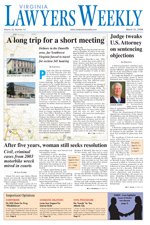An Alexandria federal district court has dismissed a securities fraud suit against two former executives who allegedly published false financial information despite knowing about their company’s “lax internal controls” and “dysfunctional accounting systems.”
A class of disappointed investors sued BearingPoint Inc., formerly KPMG Consulting LLC, its former president and CEO Randolph Blazer and former vice president and CFO Robert Falcone.
The plaintiffs claimed the former executives’ Sarbanes-Oxley Certifications showed they either knew or should have known about widespread accounting errors.
U.S. District Judge Liam O’Grady said in In re BearingPoint Inc. Securities Litigation (VLW 007-3-392), that no court in the 4th Circuit has yet addressed whether SOX Certifications can show scienter for a § 10(b) or Rule 10b-5 violation.
But district courts elsewhere have followed an 11th Circuit decision and given little weight to SOX Certifications absent “glaring accounting irregularities” or other “red flags” supporting an inference of severe recklessness or intent, O’Grady said.
BearingPoint apparently got into trouble after it gobbled up more than 30 consulting companies in Europe, Asia and South America, starting in late 2001. It developed a new financial accounting system, “OneGlobe,” to bring all North American operations under the same system.
BearingPoint encountered problems and made errors when it attempted to integrate the accounting systems of its foreign acquisitions into its overall operations.
The investors said that BearingPoint defrauded the market with misrepresentations and omissions about the timing and size of a $397 million goodwill impairment charge precipitated largely by a reduction in the value of recently acquired companies.
But the plaintiffs’ complaint foundered on what the defendant executives knew, and when they knew it.
O’Grady wrote that the “fact that a corporate officer certified financial statements later proved to be erroneous does not, in and of itself, give rise to an inference of scienter. Rather, there must be other alleged facts establishing that the signor recklessly ignored ‘red flags’ that the attested-to financial statements contained material falsities.”
Subscribe to:
Post Comments (Atom)

No comments:
Post a Comment